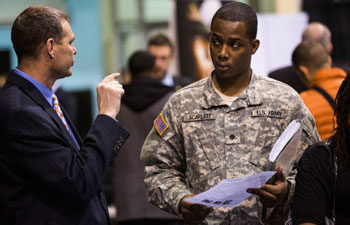

Linguist jobs in military how to#
Jensen and Rutledge were about a third of the way through the course when we spoke, and they were learning 25-30 words a day, as well as how to distinguish them – an often confusing task. "In a civilian school, this can usually take one semester," Liu said. Liu said DLI students only need about one week to learn basic syllables and phonetic sequences to the level of greeting people. Rutledge said he was nearly panicked when his class began having days without using any English.īut they're still fast learners. Both loved language and culture going into it, but neither knew a word of Mandarin. Logan Jensen and Air Force Airman 1st Class Joseph Rutledge are two of the school's current students. "Usually starting from the second month of their study, the teachers – we already use almost all of the target language in the classroom," said Zhenshuai Liu, one of the DLI's many native Chinese-language instructors.

They're six to seven hours a day (NOT including homework), five days a week, and they last for 64 weeks over three semesters. Most enlisted students take its immersion courses to go into military intelligence jobs, while federal employees from other agencies, such as the FBI and National Security Agency, also go there. The DLIFLC teaches 17 foreign languages in Monterey, California. It's one of the world's foremost language schools that can make you fluent quickly, whether you're learning Arabic, Farsi, Pashto or Mandarin Chinese. That's where the Defense Language Institute Foreign Language Center comes in. You don't have to know anything but English to go into that career, either. The job title "military linguist" sounds pretty impressive, right? It should, since linguists work around the world to translate highly classified documents and connect with troops and allied forces. We're going to have to tailor different policies and issues to the Space Force," he said. "It's going to be sized differently it's going to have to run differently. All that is being assessed right now, he said, with input from other services, foreign militaries and outside experts.

He noted that the service will have to overcome the challenge, then, of how to bring the new Space Force members together and "meld them into a common culture."Ĭrosier emphasized that the service will adopt new 21st century manning and personnel policies, noting that the specialists it requires may come from industry and academia and need nontraditional career paths. "We will commission people from any service and put them directly in the Space Force pipeline." If you want to commission as an officer, the Air Force Academy, ," Crosier said. "You'll enlist directly in the Space Force. The headquarters element already includes 14 sailors, 26 soldiers and two Marines, as well as airmen, he said.Īt least initially, infrastructure borrowed from the services will include initial training for enlisted members and officers. That said, the service will draw specialists from all services to make up its ranks, he added. If it's a Space Force-specific function, Space Force will execute," Crosier said. So we can really focus on the things we were told to do. "Eighty percent of the common support the space force needs. According to Crosier's presentation, they include the following:


 0 kommentar(er)
0 kommentar(er)
